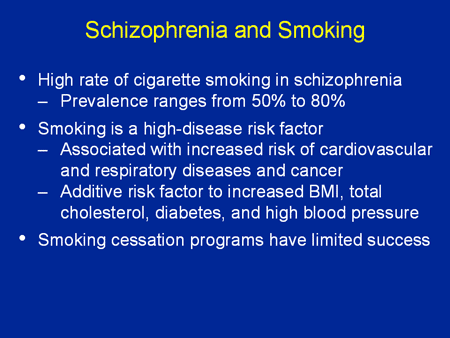Do wearable lifestyle activity monitors really work?
Schizophrenia is associated with increased rates and intensity of tobacco smoking. A growing body of research suggests that the relationship between schizophrenia and smoking stems, in part, from an effort by patients to use nicotine to self-medicate symptoms and cognitive impairment associated with the disease.
A new study, published in the current issue of Biological Psychiatry, sheds light on this hypothesis. The authors found that the level of nicotine receptors in the brain was lower in schizophrenia patients than in a matched healthy group. Further, smoking, which is known to increase the levels of receptors for nicotine in the brain, had this effect in both groups, although was blunted in schizophrenia.
However, in the schizophrenia group, the smoking-related increase in the level of nicotine receptors was associated with lower levels of social withdrawal, blunted emotional and motivational responses, as well as better cognitive function.
Nicotine mimics the actions of a natural chemical messenger, acetylcholine, which stimulates the receptors for nicotine in the brain. So, to conduct this work, Yale University School of Medicine researchers used single photon emission computed tomography to quantify the availability of nicotinic acetylcholine receptors (β2*-nAChRs) in smoking and nonsmoking individuals with schizophrenia and healthy subjects.
First author and Assistant Professor Dr. Irina Esterlis details their findings, “We found a blunted effect of tobacco smoking on the β2*-nAChR system in individuals with schizophrenia. Furthermore, we found that lower receptor availability of β2*-nAChRs in smokers with schizophrenia is associated with worse negative symptoms and worse performance on tests of executive function.”
These findings may be relevant to the high rates of smoking in schizophrenia.
 “The data seem to suggest that smoking might produce some clinical benefits for some patients by increasing the availability of receptor targets for nicotine in the brain,” commented Dr. John Krystal, Editor ofBiological Psychiatry. “This finding adds to evidence that brain nicotine-related signaling might play a role for new medications developed to treat schizophrenia.”
“The data seem to suggest that smoking might produce some clinical benefits for some patients by increasing the availability of receptor targets for nicotine in the brain,” commented Dr. John Krystal, Editor ofBiological Psychiatry. “This finding adds to evidence that brain nicotine-related signaling might play a role for new medications developed to treat schizophrenia.”
Esterlis agreed and added, “These findings suggest that β2*-nAChRs may be a target for developing treatments for negative symptoms and cognitive deficits associated with schizophrenia, for which no effective treatments exist.”
The article is “In Vivo Evidence for β2 Nicotinic Acetylcholine Receptor Subunit Upregulation in Smokers as Compared With Nonsmokers With Schizophrenia” by Irina Esterlis, Mohini Ranganathan, Frederic Bois, Brian Pittman, Marina R. Picciotto, Lara Shearer, Alan Anticevic, Jon Carlson, Mark J. Niciu, Kelly P. Cosgrove, and D. Cyril D’Souza (doi: 10.1016/j.biopsych.2013.11.001). The article appears in Biological Psychiatry, Volume 76, Issue 6 (September 15, 2014), published by Elsevier.
—-
Notes for editors
Full text of the article is available to credentialed journalists upon request; contact Rhiannon Bugno at +1 214 648 0880 or .(JavaScript must be enabled to view this email address). Journalists wishing to interview the authors may contact Dr. Irina Esterlis at .(JavaScript must be enabled to view this email address).
The authors’ affiliations, and disclosures of financial and conflicts of interests are available in the article.
John H. Krystal, M.D., is Chairman of the Department of Psychiatry at the Yale University School of Medicine, Chief of Psychiatry at Yale-New Haven Hospital, and a research psychiatrist at the VA Connecticut Healthcare System. His disclosures of financial and conflicts of interests are available here.
About Biological Psychiatry
Biological Psychiatry is the official journal of the Society of Biological Psychiatry, whose purpose is to promote excellence in scientific research and education in fields that investigate the nature, causes, mechanisms and treatments of disorders of thought, emotion, or behavior. In accord with this mission, this peer-reviewed, rapid-publication, international journal publishes both basic and clinical contributions from all disciplines and research areas relevant to the pathophysiology and treatment of major psychiatric disorders.
The journal publishes novel results of original research which represent an important new lead or significant impact on the field, particularly those addressing genetic and environmental risk factors, neural circuitry and neurochemistry, and important new therapeutic approaches. Reviews and commentaries that focus on topics of current research and interest are also encouraged.
Biological Psychiatry is one of the most selective and highly cited journals in the field of psychiatric neuroscience. It is ranked 5th out of 135 Psychiatry titles and 14th out of 251 Neurosciences titles in the Journal Citations Reports® published by Thomson Reuters. The 2013 Impact Factor score for Biological Psychiatry is 9.472.
About Elsevier
Elsevier is a world-leading provider of information solutions that enhance the performance of science, health, and technology professionals, empowering them to make better decisions, deliver better care, and sometimes make groundbreaking discoveries that advance the boundaries of knowledge and human progress. Elsevier provides web-based, digital solutions - among them ScienceDirect, Scopus, Elsevier Research Intelligence, and ClinicalKey - and publishes nearly 2,200 journals, including The Lancet and Cell, and over 25,000 book titles, including a number of iconic reference works.
The company is part of Reed Elsevier Group PLC, a world leading provider of professional information solutions in the Science, Medical, Legal and Risk and Business sectors, which is jointly owned by Reed Elsevier PLC and Reed Elsevier NV. The ticker symbols are REN (Euronext Amsterdam), REL (London Stock Exchange), RUK and ENL (New York Stock Exchange).
###